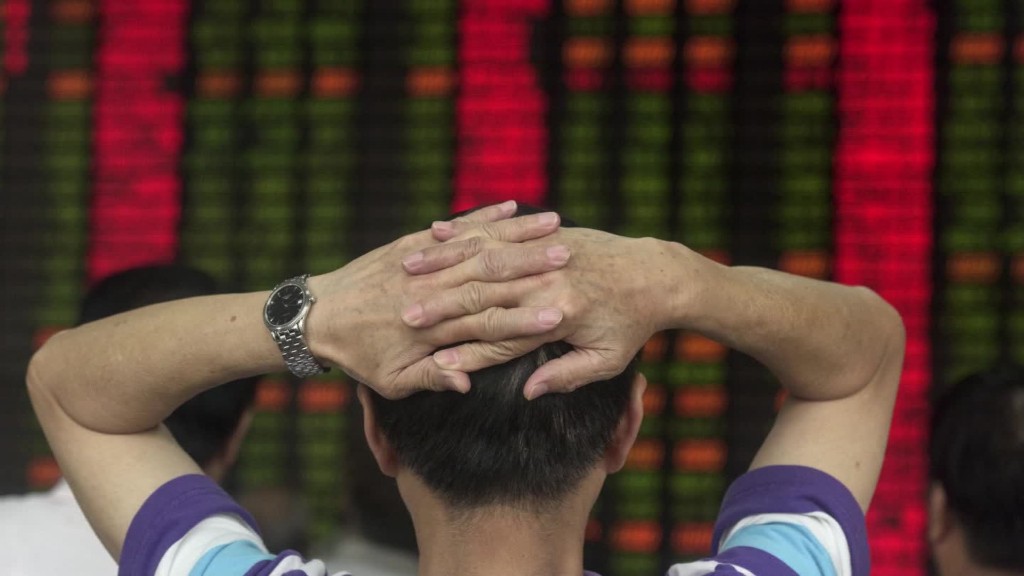
If you're looking for a reason to be scared of stocks in 2016, look no further than China.
It took no time at all for fears about China's economic slowdown and market gyrations there to put U.S. investors in a bad mood this year. The Dow dropped as much as 467 points before recovering from the lows and ending the day down 276 points. And Nasdaq lost 2% on Monday, the first trading day of 2016, after stocks in China crashed overnight.
The fact that 2016's first big panic attack is being fueled by China is fitting. Most investing professionals recently surveyed by CNNMoney listed China as the biggest risk to U.S. stocks.
"Let's face it, any negative vibe out of China has global ramifications. That's just the world we live in now," said Joseph Quinlan, chief market strategist at U.S. Trust, Bank of America's private wealth arm.
The world's engine of growth is slowing
After years of rapid growth, China is the world's second-biggest economy. Its explosive expansion lifted many other economies, especially Latin American countries that make the raw materials Beijing consumes.
But now that China is maturing into a more developed market, its appetite for raw goods has eased considerably. But that's raised concerns that its economy is slowing at a much faster pace than previously thought.
That's why investors were alarmed when a new private report showed China's manufacturing sector contracted in December following two months of stabilization.
The Shanghai Composite plummeted nearly 7% in response and that wave of selling spread overseas, sending the Dow diving below the 17,000 level for the first time since October.
Related: Stock market selloff: Just how bad is it?
Few believe China's government data
The reaction to the manufacturing report, released by Chinese media group Caixin, also showcases investors' lack of confidence in China's official economic reports. The government's manufacturing gauge, which focuses on large enterprises, painted a rosier picture than the Caixin report.
"Investors are concerned about the likelihood of smoke and mirrors that surround the official economic data," said Sam Stovall, managing director of U.S. equity strategy at S&P Capital IQ.
Crash landing in China could kill bull market
If China is indeed slowing dramatically faster than investors realize, there is a risk the global economy could be dragged into a recession.
A global recession would likely kill the bull market in U.S. stocks, which are trading at expensive valuations despite logging their worst year since 2008. The S&P 500 is trading at 18.2 times trailing profits, which is above the five-year average of 15.6, according to FactSet Research.
Corporate profits continue to be dented by the strong U.S. dollar, sluggish global growth and the crash in oil prices. Analysts say S&P 500 companies in the fourth quarter suffered their first back-to-back decline in earnings since 2009.
And then there are other threats to U.S. stocks. Some remain skeptical that the economy and market will be able to weather the Federal Reserve's first interest rate hike in nearly a decade. Others are worried about geopolitical instability in the Middle East, especially from ISIS and rising tensions between Iran and Saudi Arabia.
But it's clear that right now China reigns as the biggest influence on Wall Street.
So China's sometimes-bumpy efforts to open up its financial markets can create turbulence.
For instance, stocks in China -- and the U.S. -- plunged last summer after China surprised investors by devaluing its currency. Likewise, some say Monday's market crash in China was at least partially caused by Beijing installing new circuit breakers aimed at smoothing out market volatility. These circuit breakers were triggered on the very first day they took effect.
Related: Dow dives below 17,000
Can China get back on track?
The good news is that many believe China is just going through natural growing pains that won't wreck the global economy. They say China has the ability to manage through this difficult time of transition.
Not only does China's central bank have room to boost growth by cutting interest rates, but the government has more than $3 trillion to spend on stimulus.
"China has quite a lot of fiscal flexibility that many other countries would be envious of," said Ben Laidler, global equity strategist at HSBC.
Let's hope China uses that flexibility wisely. If not, Monday's market plunge suggests 2016 could be a rough year for U.S. investors.


